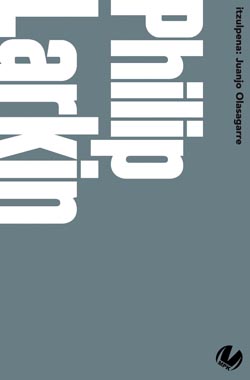
Gogoan dut, gogoan
Bagindoazen behin, urte hasiera hotz batean,
ezohiko bidetik Ingalaterran gora
eta trena gelditu egin zen; han ageri ziren
gizonak kartelak eskuetan ate ezagunetarantz lasterka.
“Hara, Coventry”, oihukatu nuen, “hemengoa naiz”.
Atera nintzen, herri hura “nire” herria
izan zeneko seinaleren baten bila.
Alferrik, jada ez nuen
leku hura ezagutzen. Familia oporretara,
bizikleta zahar horiek zeuden tokitik
abiatzen ote zen? Txistuak jo zuen:
Trenaren trinki-tranka. Burumakur eseri nintzen.
“Hortaz, hemen dituzu” egin zidan irribarre lagunak “sustraiak?”
Ez, haurtzaroa alferrikaldutako tokia,
erantzun nahi izan nion, haslekua baino ez:
Orain akordatzen naiz tokiarekin.
Gure lorategia: non ez nuen asmatu
lore edo fruituei buruzko
teologia itzelik,
non ez zitzaidan sonbreiru zaharrik mintzatu.
Eta, hara, familia zoragarria
zeinarengana ez nuen jo depresio aldietan,
mutikoak, dena bizeps, neskak, dena bular,
Ford barregarria, etxaldea, non “ni nerau”
izan nintekeen. Are gehiago , erakutsiko dizut
dar-dar batean eseri ez nintzeneko iralekua,
nirean tenkor, non neska
jiratu, eta dena bihurtu baitzen laino gori.
Tailer horretan ez zituzten paper
horiztatuan nire bertso kaskarrak inprimatu,
ez eta alkatearen lehengusu jaunak ere leitutakoan
gure aitari hots egin eta esan
Gure mutiko hau, etorkizunean handia...
“Zure aurpegiaren arabera ematen du”
esan zidan lagunak “gorroto duzula lekua”
“Oi”, nik, “uste dut ez dela lekuaren errua”.
“Zerbait nonbait gertatu behar duela eta
halaxe deus ez!”.
I Remember, I Remember
Coming up England by a different line / For once, early in the cold new year, / We stopped, and, watching men with number-plates / Sprint down the platform to familiar gates, / ‘Why, Coventry!’ I exclaimed. ‘I was born here.’ // I leant far out, and squinnied for a sign / That this was still the town that had been ‘mine’ / So long, but found I wasn’t even clear / Which side was which. From where those cycle-crates / Were standing, had we annually departed // For all those family hols? ... A whistle went: / Things moved. I sat back, staring at my boots. / ‘Was that,’ my friend smiled, ‘where you “have your roots”?’ / No, only where my childhood was unspent, / I wanted to retort, just where I started: // By now I’ve got the whole place clearly charted. / Our garden, first: where I did not invent / Blinding theologies of flowers and fruits, / And wasn’t spoken to by an old hat. / And here we have that splendid family // I never ran to when I got depressed, / The boys all biceps and the girls all chest, / Their comic Ford, their farm where I could be / ‘Really myself’. I’ll show you, come to that, / The bracken where I never trembling sat, // Determined to go through with it; where she / Lay back, and ‘all became a burning mist’. / And, in those offices, my doggerel / Was not set up in blunt ten-point, nor read / By a distinguished cousin of the mayor, // Who didn’t call and tell my father There / Before us, had we the gift to see ahead — / ‘You look as if you wished the place in Hell,’ / My friend said, ‘judging from your face.’ ‘Oh well, / I suppose it’s not the place’s fault,’ I said. / ‘Nothing, like something, happens anywhere.’